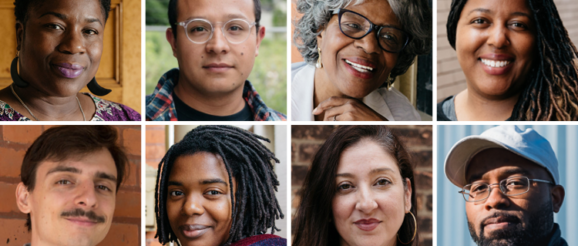The Power of Investing in People: 6 Lessons from the Detroit Innovation Fellowship

The Power of Investing in People: 6 Lessons from the Detroit Innovation Fellowship
by Pamela Lewis
In 2017, my colleagues and I at the New Economy Initiative (NEI), an entrepreneurial development strategy of the Community Foundation for Southeast Michigan, explored ideas to connect southeast Michigan’s innovation assets — universities, medical centers, tech startups, etc. — to community-minded Detroiters. Our hope was to leverage the expertise and resources of those assets to solve challenges residents were facing in their neighborhoods.
After strategizing in our downtown Detroit office, we landed on what we thought was a promising model. First, we would issue a citywide challenge through which residents could articulate the most urgent challenges in their neighborhoods. Then, we’d connect them with technical experts based within the region’s innovation assets to develop plans to address those challenges. Finally, we’d fund those plans with grants. It was time to run this concept by community partners for external validation.
One of our first conversations, with Jenny Lee and Diana Nucera of Allied Media Projects, proved to be very important. They urged us not to issue yet another citywide challenge. Residents were fatigued by constantly having to reframe their ideas for strengthening their neighborhoods according to what they thought funders wanted to hear. And besides, resident innovators were already doing the work! Go find those people, then support them.
Residents were fatigued by constantly having to reframe their ideas for strengthening their neighborhoods according to what they thought funders wanted to hear.
The Detroit Innovation Fellowship launched in June of 2018. Twelve innovators, representing nine projects around Detroit, were invited to participate. Our partners at the Urban Consulate brought the fellows together on a quarterly basis to discuss their common challenges and opportunities and hear from experts on subjects of mutual interest. The Urban Consulate also helped the fellows design their own professional development programs, which ranged from attending conferences to visiting peer projects in other cities to taking courses to acquire licenses. NEI announced its second cohort of Detroit Innovation Fellows in July of this year.
Here are a few valuable lessons we learned from this program that we hope to impress upon other funders hoping to create positive change in challenged neighborhoods:
1) Innovation is already occurring in neighborhoods and minority communities, and it’s being led by residents. Detroit has no shortage of talented, visionary residents who can create positive change if the people with power, money, and privilege take affirmative steps to find and fund them.
2) People doing innovative work in their neighborhoods need recognition, not just funding. Several of our fellows told us they had never thought of a fellowship as something for them, and the experience has lent them prestige and opened doors. It’s also helped build their confidence and affirmed the value of their work.
3) It’s okay for people to spend funds the way they want to. We viewed the Detroit Innovation grant stipends as mini-MacArthur Genius Grants, leaving it up to the fellows to spend the money on what they felt was most necessary to advance their projects. Some used funds to cover living expenses, while others bought tools like laptops or supplies for neighborhood beautification projects. One even purchased a washing machine, which helped her reallocate time spent at the laundromat to working on her project.
4) Be flexible about who and what you fund. Many of the folks making positive change in their communities whom we learned about during our listening sessions were not connected to nonprofits. Some of them ran small businesses, while others acted as individuals. They ranged in age from the mid-20s to mid-70s and had wide differences in career and educational backgrounds. The common thread was their commitment toward community, and it quickly became clear how much they could learn from one another.
5) Storytelling > grant reporting. Rather than requiring formal written grant reports from our fellows, we worked with them to create videos that documented their projects, an asset they can use to promote their work.
6) People are tired of challenges. We heard from most of our fellows what a relief and an honor it was to be invited to participate in something rather than having to apply. While challenges have the veneer of being democratic processes, people still question how and why some people win while others don’t. A longer, intentional listening process, on the other hand, allows funders to understand the diversity of innovation happening in a community and to thoughtfully build a cohort that represents that community, rather than selecting from the pool of folks who are most skilled at writing applications.
While challenges have the veneer of being democratic processes, people still question how and why some people win while others don’t.
To learn more about the Detroit Innovation Fellows and their projects, visit DetroitInnovation.org and check out these videos.

The post The Power of Investing in People: 6 Lessons from the Detroit Innovation Fellowship appeared first on .
